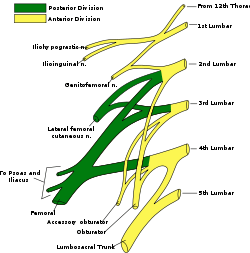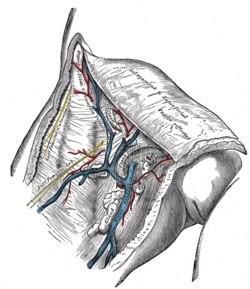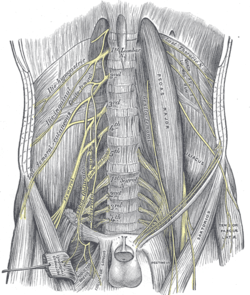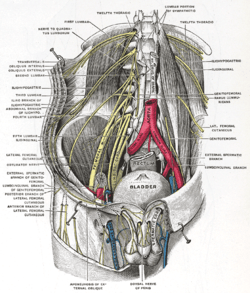Lateral cutaneous nerve of thigh
| Lateral cutaneous nerve of thigh | |
|---|---|
 Plan of lumbar plexus. (Lateral femoral cutaneous visible at left.) | |
|
Cutaneous nerves of the right lower extremity. Front and posterior views. | |
| Details | |
| From | lumbar plexus (L2–L3) |
| Innervates | Skin on the lateral part of the thigh |
| Identifiers | |
| Latin | nervus cutaneus femoris lateralis |
| TA | A14.2.07.011 |
| FMA | 16485 |
The lateral cutaneous nerve of the thigh (also called the lateral femoral cutaneous nerve) is a cutaneous nerve that innervates the skin on the lateral part of the thigh.
Structure
The lateral cutaneous nerve of the thigh is a nerve of the lumbar plexus. It arises from the dorsal divisions of the second and third lumbar nerves. It emerges from the lateral border of the psoas major at about its middle, and crosses the iliacus muscle obliquely, toward the anterior superior iliac spine (ASIS). It then passes under the inguinal ligament, through the lacuna musculorum and then over the sartorius muscle into the thigh, where it divides into an anterior and a posterior branch.
The anterior branch becomes superficial about 10 cm below the inguinal ligament, and divides into branches which are distributed to the skin of the anterior and lateral parts of the thigh, as far as the knee. The terminal filaments of this nerve frequently communicate with the anterior cutaneous branches of the femoral nerve, and with the infrapatellar branch of the saphenous nerve, forming with them the peripatellar plexus.
The posterior branch pierces the fascia lata, and subdivides into filaments which pass backward across the lateral and posterior surfaces of the thigh, supplying the skin from the level of the greater trochanter to the middle of the thigh.
Entrapment is caused by compression of the nerve near the ASIS and inguinal ligament and is commonly known as Meralgia paraesthetica.
Additional images
 Lateral cutaneous nerve of thigh and other structures passing behind the inguinal ligament
Lateral cutaneous nerve of thigh and other structures passing behind the inguinal ligament The great saphenous vein and its tributaries at the fossa ovalis.
The great saphenous vein and its tributaries at the fossa ovalis. The lumbar plexus and its branches.
The lumbar plexus and its branches. Deep and superficial dissection of the lumbar plexus.
Deep and superficial dissection of the lumbar plexus. Diagram of segmental distribution of the lateral cutaneous nerve (shaded) and other nerves of the right leg. Front view.
Diagram of segmental distribution of the lateral cutaneous nerve (shaded) and other nerves of the right leg. Front view. Cutaneous nerves of the right lower extremity. Front and posterior views.
Cutaneous nerves of the right lower extremity. Front and posterior views.
See also
References
This article incorporates text in the public domain from the 20th edition of Gray's Anatomy (1918)
External links
- Lateral_femoral_cutaneous_nerve at the Duke University Health System's Orthopedics program
- Anatomy photo:40:17-0201 at the SUNY Downstate Medical Center - "Posterior Abdominal Wall: Nerves of the Lumbar Plexus"
- posteriorabdomen at The Anatomy Lesson by Wesley Norman (Georgetown University) (posteriorabdmus&nerves)